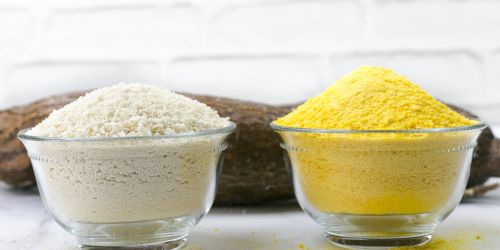Because of the great demand for the goods, garri (groceries) processing is a successful business in Nigeria. Garri is a traditional African cuisine staple produced from cassava, a root crop grown extensively in Nigeria and other African countries. Nigeria is the world’s greatest producer of cassava, hence garri processing is a lucrative business in the country.
Let’s look at what needs to be in place for a lucrative garri processing business, in no particular sequence.
What is Garri?
Garri is manufactured as a powder with fine granules, which does not qualify as grain. Even though it feels like grain when touched, it is not. You can soak it like conventional cereal and couple it with groundnuts (floating berries), peanuts, cashew nuts, fried fish, coconut, and other ingredients. It can also be converted into eba as a “swallow food” by combining several soups.
What Is The Garri Processing Business In Nigeria?
Garri processing is a business that converts cassava tubers into garri, a popular snack in Nigeria and Africa. Manihot esculenta is the scientific name for cassava. Cassava tuber cultivation, harvesting, peeling, washing, grinding, fermenting, pressing, and lastly frying are all aspects of the business. The cassava tubers are turned into a dry, granular form known as garri throughout these stages.
It is critical to perform a study on the optimum methods of cultivation, harvesting, processing, and packaging before starting a garri processing business. The production yield of garri is affected by a number of factors, including cassava variety, soil type, and climate. However, with appropriate farming practices and effective processing processes, substantial garri yields are feasible.
Because of the great demand for the commodity, garri processing is a profitable business in Nigeria and Africa. According to statistics, Nigeria is the world’s greatest producer of cassava, with an annual output of more than 50 million metric tons. Garri is a staple cuisine in Nigeria, with the country consuming about 2.5 million metric tons of it each year. Furthermore, there is a growing demand for garri in other African countries as well as the international market, providing export potential for Nigerian garri processing enterprises.
Types of Garri
Garri has diverse appearances and flavors depending on where it is grown and the preferences of the locals. I’ve heard debates regarding whether the region of West Africa produces the best garri. This, I feel, is relative, and preferences are frequently based on the type of garri people are accustomed to eating.
The following are some of the most common forms of garri:
#1. White Garri
This type of Garri is native to Nigeria’s western region. It is popular among the Yorubas, while other Nigerian tribes consume it as well. We have the Ijebu type of garri from Ogun State under this white garri.
This type of garri is popular for its acidic taste when consumed. Then there’s white garri, which is only used to create garri – what the Yorubas call eba. In Nigeria, white garri is in high demand since it can be used to produce any type of garri meal.
#2. Yellow Garri
Garri Ibo, often known as garri, is a popular food in the Niger Delta and eastern areas of Nigeria. During the frying step of making Nigerian garri, palm oil is added. It gets its yellowish color from the inclusion of palm oil, hence the name. Yellow garri is starchier and thus thicker. This feature, together with the fact that it is not sour, makes it ideal for creating eba.
#3. Ijebu Garri
Because of its sour taste, this sort of Nigerian garri is popular for soaking. It is fermented for a longer amount of time than other forms of garri, usually seven days. Because starch is transformed into alcohol during the fermentation process, it has a stronger taste and a lower starch content. Ijebu garri is manufactured in Western Nigeria’s Ijebu region and is more dry/crispy with finer granules than other forms of garri.
#4. Ghana Garri
It is a variety of white garri manufactured in Ghana. It is dried in the sun after fermentation and pressed before being roasted, which makes it slightly different from other sorts. This gives it a crisper texture than conventional white garri. Ghana garri is ideal for eba since it is starchy and viscous. This is what we eat more of because it is readily available in my local supermarket.
How to Start Garri Business in Nigeria
Here are the steps to starting a garri business in Nigeria.
#1. Conduct Market Survey
Every product (food or non-food) has its own market, whether in Nigeria or beyond, and it is critical to grasp it before pouring your money, strength, and thoughts into it. When I say “understand the market,” I mean “understand how the product sells,” “understand how to make it last in your store to reduce loss,” “understand how to recognize the quality ones from the substandard,” “understand when it is in surplus or scarce,” and “understand when it is in season and not in season.”
All of this is important to understand about the garri business, especially the type of garri business you intend to start (manufacturing or distribution). And the easiest method to achieve this is to visit all garri companies in your area to gather additional information. You can also go to garri shops in the market. All of these, together with the one you’ve received today, will go a long way toward helping you.
#2. Get the Required Capital
Based on your understanding of the business and the type of garri business you want to create, you can now calculate how much capital you will need to get started. If you want to start a garri production business, you will require roughly N2,000,000 (#2M) in capital.
If you want to start as a distributor, you will need a capital of N800,000, and if you want to start small, you will need a capital of around N400,000. But keep in mind that all of the capital I’ve given here are relative to where you live in Nigeria, inflation, and other things.
As for where to get this capital to begin with, you can save it. I know it appears difficult, but it is feasible. If you don’t have enough time or money, you can meet with relatives and friends (who you know would support you) to invest in the business. Do not borrow from a bank or any other lending institution because the interest rate is usually exorbitant and the risk is usually absurd.
#3. Rent a Store or Space
Renting a store is essential for your garri business. You’ll need a place to store your garri that’s free of rain and rats. You need a location where your consumers may simply find you and meet you in order to patronize you. This store is essential if you want to get into the garri business as a distributor or small-scale seller.
However, there are other factors to consider when renting a store for this business. Other factors to consider are the size of the store, its location (which is the most essential aspect here), ease of access to the road, and others. But, if you ask me, the most significant factor here is the placement of the store, which I strongly advise should be on the roadside – a site where many Nigerians walk through on a daily basis.
This might happen at a roundabout, bus stop, or intersection. This is to ensure that many Nigerians will easily patronize you. If you want to make garri, you don’t need a store beside the road because you’ll need more than a store. You can reach any place as long as the roads are well-maintained.
#4. Selling your Garri
This is frequently the most difficult aspect of any business. How do you sell your goods and market them, offering them to potential buyers? This is why I mentioned your store’s location previously.
If you get the site of your store just right – that is, at a place where thousands of Nigerians pass by every day – you will not need to introduce your garri to people since they will be able to see you readily. Instead of going to meet clients, the ideal location invites them to your shop.
The ideal placement also saves you money that you would have spent on marketing your garri. When all of this is completed, selling your garri will be simple.
#5. Profits in Garri Business
There are several ways to sell your garri without spending money or stressing yourself out, and I’ll mention them below.
A. Sell to Friends and Family
This is one method for quickly selling your garri. Because your friends and family know you, let them be your first clients and buy from you. All you have to do is introduce them to the business and promise them high-quality garri at lower costs, and they will come. You can also guarantee them benefits if they refer a consumer to you. This will encourage them to bring buyers with them.
B. Sell to Party Organizers
This was discussed in one of our previous posts. When it comes to attracting large buyers for your Nigerian food business, one option is to sell your cuisine to party organizers. This could include marriages, anniversaries, and other events.
Because garri is used to make eba, you can introduce them to what you sell by providing a better pricing offer. This may not appear to be a major concern, but it should not be overlooked.
C. Sell your Garri Online
Selling your garri online is another technique to enhance sales and thus profit in your garri business. There are numerous internet places where you can sell your garri. The following e-commerce platforms are listed in no particular order:
- Jiji
- Konga
- Jumia
and much more. To begin selling on these sites, simply register as a seller by filling out some information and providing clear images. When you’re finished and customers like your prices, they’ll start calling to order their garri from you.
#6. Risk in Garri Business
There are risks in the garri business, and as a Nigerian entering the industry, you must be aware of them. Some of them have been duped or sold subpar garri, garri deteriorating in your store, garri scarcity, garri devoured by mice, or garri exposed to rain, among other things.
What is Cassava Gari?
Gari is a creamy-white granular flour with a sour flavor and a somewhat fermented flavor. It is made from cassava tubers and served as a main course with soup or stew. Gari has a shelf life of six months or longer when properly stored.
What is the History of Garri?
The origin of garri is a hotly debated topic. There are two different ideas about garri’s history and origins. The first theory holds that Portuguese traders brought garri to Africa from South America in the 15th century. It’s also one of the few African cuisines with a clear connection to the Americas.
What is the Importance of Garri?
It strengthens the immune system. Minerals like copper and magnesium, as well as vitamins like B17 and A found in garri, play key roles in the maintenance of healthy bones, nerves, and the immune system of the human body.
What is the Composition of Garri?
A 100-gram serving of Garri (White), Garin rogo (Hausa), or Garri (Yoruba) contains 363.189 calories, 1.596g of protein, 0.724g of fat, and 86.889g of carbohydrates.
Which State has the Best Garri in Nigeria?
Although Garri is produced in most parts of the South-West, many people say that the Garri Ijebu produced in Ijebu, Ogun State, is the greatest.
Is Garri Good for the Health?
Garri has a high folate content. A good amount of garri can easily replace your daily folate needs. Furthermore, garri is a good source of copper. Garri can be used to treat mild to moderate diarrheal dehydration.
Conclusion
If you are passionate about business and are not in a hurry to earn cash, the garri business can be a profitable foodstuff business in Nigeria. It all comes down to you understanding the market and performing due diligence. As the business grows, you can diversify by selling other goods such as rice, beans, flour, and others in order to increase revenues.
Related Articles
- Best Online Business Ideas to Try Out in Nigeria 2023
- Legit Online Business That pays In Nigeria
- Great Ideas: 10+ Ideas to Achieve Your Goals in 2023
- GO NIGERIAN TRADE FAIR – PROMOTING NIGERIAN PRODUCTS
- Top 11+ Online Jobs For Students In Nigeria






